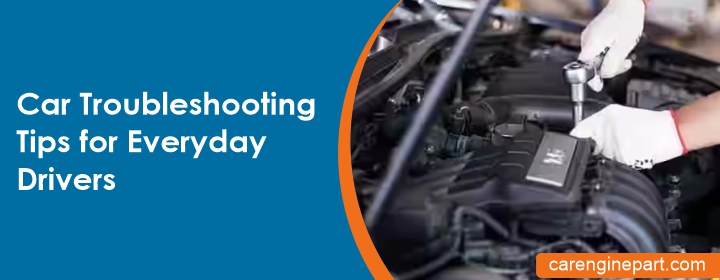
Car Troubleshooting Tips for Everyday Drivers
If you own a car, then it’s inevitable to deal with problems every now and then. These problems can range from Warning light indication, Engine Issues, Slipping Gears, Poor Fuel efficiency and many more. In some cases the problem could be related to a worn out engine and opting for a used engine can be a cost effective solution. Many times the problem is very minute and can be managedon your own. But lack of basic knowledge limits our capabilities to do so. Here you have a proper guide about basic car troubleshooting tips.
A little knowledge can save your time and money and reduce your stress.
1. Dashboard Warning Lights
Don’t ignore your dashboard lights.
- Red light indicates an issue that needs immediate attention
- Yellow light indicates that some issue will need attention in some time soon.
if the check engine light turns on, the issue can range from something simple like a loose gas cap or more serious like a faulty oxygen sensor.
2. Car Won’t Start
If your car doesn’t start then the issue might be in
- Battery – you should check if the lights are turning-on on the dashboard. If not, then it’s likely that you have a dead battery, or the terminals of the battery are corroded. You can easily deal with both of these issues yourself quite easily. Basic car troubleshooting tips like this helps in dealing with such minor problems.
- Starter or Ignition switch – if there is a clicking sound when you turn the key, it means the starter is bad, because it is responsible for cranking the engine.
- Clogged Air Filter – in some cases, if there is excessive dirt accumulated on the air filter then engine chamber doesn’t get enough air so it doesn’t start. You can easily wash the filter and issue will be resolved.
- Security System Lockout – if the anti-theft system of the car is triggered, it won’t start. Check if there is a security light blinking on the dashboard. You can easily turn it off by your key fob.
3. Unusual Noises
Different sounds can give indication about different problems
- Squealing sound during braking could mean the braking pads are worn out.
- Knocking sound from engine chamber could mean low oil levels.
- Rattling sounds may indicate that there is loose part somewhere in the engine body or anywhere else.
Although all of these issues can be rectified by the user easily with some knowledge and resolve, but you are encouraged to go to a mechanic for these.
4. Poor Fuel Efficiency
Poor fuel efficiency doesn’t always occur due to engines high mileage or any technical issue. Sometimes something simple as low tire pressure can cause this. A dirty air filter or faulty spark plug can affect the air and oxygen consumption, which in turn cause the engine to consume more fuel. This issue can be resolved with basic car troubleshooting tips andin minutes by your own hands.
5. Engine Over-Heating
Usually this happens when there are low levels of coolant or any other fault in the coolant system. Which can be handled easily by ourselves with simplest of tools.
But if there is a leak under the car or thermostat or radiator is faulty then it’s a different story. Only a mechanic will be able to manage these faults.
Conclusion
These tips are a good starting point to know about car troubleshooting tips.These issues come under the category which are simple and can be managed by you easily in your own space and home. No technical knowledge is required to resolve these. But some issue can only be resolved by a seasoned mechanic.
If you’re unsure about the issue or it seems quite serious, it’s best to consult an experienced mechanic. By doing this you will prevent small issue to become a major problem.
FAQ’s
Q.1.What should I do if my car won’t start?
First check if battery is working, lights are turning on in the dashboard. Check if there is enough fuel. You can also try to listen if there is a clicking sound, if it is then you have faulty ignition switch on your hand. Other than these, then you should get it checked by a mechanic
Q.2.why is my car making strange noise?
A rattling sound may come due to a loose part, knocking sounds can mean low engine oil in the engine chamber and squealing sound majority of the times comes from worn out brake pads.
Q.3.What causes the “check engine” light come on?
Generally it happens when there is an issue in the engine be it overheating or something else, or when there is problem in emission control system.
Q.4.How do I know if my cars transmission is failing?
If you experience slipping during shifting your cars gears, or if the gears get stuck while changing them it means your transmission is at its last feet.
Q.5.what are common signs of brake problems?
While applying brakes if you hear a squealing sound, it means brake pads have been worn out. Dashboard brake warning light, feeling unusual vibrations during braking. Free and soft brake pedal are some common signs of brake problems

